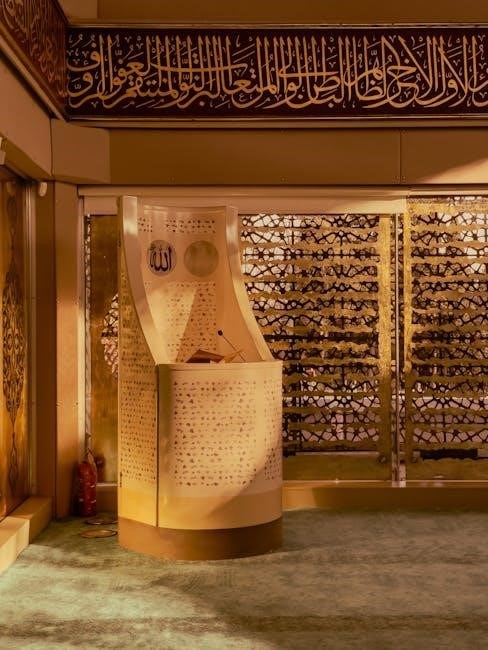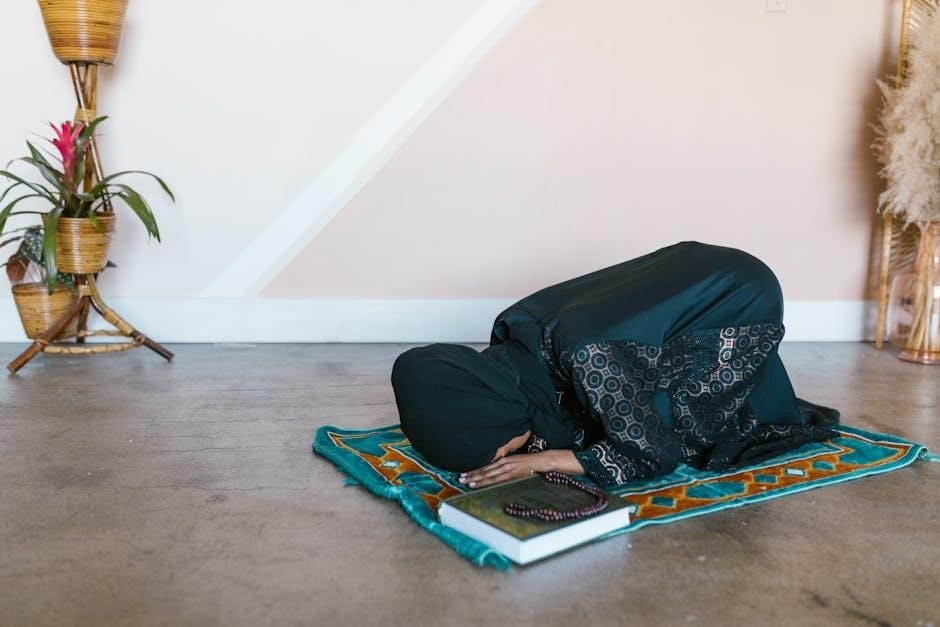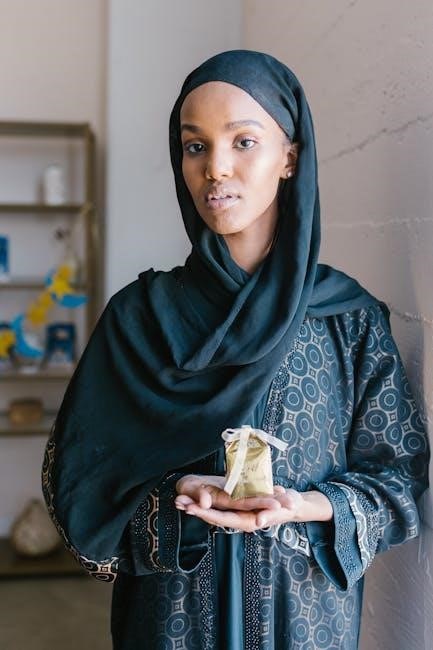The Arabic language holds immense significance in Pakistan‚ deeply intertwined with its cultural and religious heritage. Many Pakistani languages borrow words from Arabic‚ reflecting its historical influence and making learning Arabic easier for some.
Numerous resources are available for learning Arabic in Pakistan‚ ranging from traditional institutes to modern online platforms. These resources include textbooks‚ language centers‚ online courses‚ and even free PDF materials catering to diverse learning preferences.

Importance of Arabic Language in Pakistan
The importance of Arabic in Pakistan stems from its profound religious and cultural connections. As the language of the Quran‚ learning Arabic enables a deeper understanding of Islamic teachings and practices‚ crucial for many Pakistanis. Furthermore‚ Arabic has significantly influenced Urdu‚ the national language‚ with numerous words and phrases originating from it. This linguistic connection makes learning Arabic more accessible for Urdu speakers.
Beyond religion‚ Arabic is also valuable for understanding historical texts and cultural traditions. Educational institutions recognize its importance‚ offering courses at various levels. This widespread availability underscores its role in Pakistan’s educational landscape‚ fostering a greater appreciation for the language and its global significance.
Availability of Arabic Learning Resources
Pakistan offers a diverse range of resources for individuals interested in learning Arabic. Traditional language institutes‚ such as the Institute of Arabic Language Islamabad‚ provide structured courses with experienced instructors. AIOU’s Arabic Teacher Training Program further supports Arabic education by training qualified teachers. For those seeking flexibility‚ online platforms like Arab Academy and Madinah Arabic offer courses accessible 24/7.
Furthermore‚ many language centers across Pakistan provide Arabic courses ranging from beginner to advanced levels. Free resources‚ including PDF documents and YouTube channels‚ are also available for self-learners. This comprehensive availability ensures that individuals with varying learning styles and preferences can find suitable resources to begin or enhance their Arabic language skills.

Arabic Courses and Programs in Pakistan
Pakistan offers a variety of Arabic courses and programs‚ catering to different skill levels and learning preferences. These range from intensive language courses to specialized teacher training programs.
Institute of Arabic Language Islamabad
The Institute of Arabic Language Islamabad stands as a prominent institution dedicated to promoting the Quran and Arabic language in Pakistan. For over three decades‚ it has been committed to publishing resources and fostering the study of Arabic. The institute offers courses designed to help students acquire basic reading‚ writing‚ and understanding of Arabic. These programs are designed to quickly impart conversation skills from the very first class. The institute’s goal is to make the language accessible‚ especially for religious studies and cultural enrichment within Pakistan. Its mission aligns with the promotion of Arabic.
AIOU’s Arabic Teacher Training Program
Allama Iqbal Open University (AIOU) has been a pioneer in Arabic teacher training in Pakistan. In 1982‚ AIOU launched Pakistan’s first Arabic Teachers Training Program (ATTC). This initiative reflects the university’s commitment to promoting Arabic education. The AIOU’s program aims to equip educators with the necessary skills and knowledge to effectively teach Arabic at various levels. The program supports the integration of Arabic into the educational curriculum. AIOU’s efforts have significantly contributed to the development of Arabic language instruction. These programs are a cornerstone in the nation’s educational landscape. AIOU’s initiative addresses the need for well-trained Arabic language educators.
Language Center Courses (Easy to Advanced Level)
Language centers in Pakistan offer Arabic courses spanning from easy to advanced levels‚ catering to learners of all proficiencies. These courses are often led by highly trained faculty members with extensive exposure to the Arab world. The curriculum typically covers Arabic script‚ basic to intermediate grammar‚ vocabulary‚ reading‚ writing‚ and conversational skills. The methodology includes textbooks and online resources. These courses aim to equip learners with the ability to communicate effectively in Arabic‚ both in written and spoken forms. They provide a structured and immersive learning environment. The centers are crucial for language acquisition. The faculty members provide invaluable experience. These courses enhance linguistic and communicative competence.

Online Arabic Learning Platforms
Online platforms provide accessible avenues for learning Arabic‚ offering courses for various levels. These platforms‚ such as Arab Academy and Madinah Arabic‚ deliver structured lessons and interactive resources.
Arab Academy Online Arabic Courses
Arab Academy provides a trusted and effective online platform for individuals eager to learn the Arabic language. Their courses cater to a wide range of learners‚ from beginners to advanced students‚ ensuring comprehensive language acquisition. Enrolling in Arab Academy’s online Arabic courses offers an exciting journey‚ guiding you towards fluency through structured lessons and interactive learning experiences.
These courses are available 24/7‚ accommodating diverse schedules and learning preferences. With a focus on practical application‚ Arab Academy equips learners with the skills necessary to communicate confidently in Arabic. Their approach integrates modern teaching methodologies to ensure an engaging and effective learning experience for all.
Madinah Arabic Online Courses
Madinah Arabic offers free online courses designed to help beginners start their Arabic learning journey. These courses address fundamental questions and provide a solid foundation for understanding the language. The platform offers various courses to facilitate speaking‚ reading‚ and vocabulary acquisition.
Learners can navigate through the available resources to develop their Arabic skills progressively. Madinah Arabic provides a structured approach for new learners to learn and understand the Arabic language; The courses are designed to make learning accessible and enjoyable‚ enabling individuals to build confidence in their abilities. The platform emphasizes core language skills.

Resources for Learning Arabic
A wealth of free PDF resources is available to support Arabic language learners. These resources cover grammar‚ vocabulary‚ and exercises‚ catering to different skill levels and learning preferences for effective study.
Free PDF Resources for Arabic Learning
Numerous websites offer downloadable PDF resources to facilitate Arabic language acquisition. These include comprehensive grammar guides‚ vocabulary lists categorized by topic‚ and collections of exercises with answer keys. Some PDFs focus on specific skills‚ such as reading comprehension or writing practice. Learners can also find textbooks in PDF format‚ often older editions available for free. For religious studies‚ PDFs containing Quranic Arabic lessons and explanations are accessible. These free resources provide a cost-effective way to supplement formal learning or to study independently‚ allowing learners to progress at their own pace. Supplementing resources are also available for different dialects.
YouTube Channels and Playlists for Arabic Learning
YouTube offers a wealth of channels and playlists dedicated to Arabic language learning‚ catering to various levels and interests. Many channels provide structured lessons covering grammar‚ vocabulary‚ and pronunciation‚ often incorporating visual aids and interactive exercises. Some focus on specific dialects‚ such as Egyptian or Levantine Arabic‚ while others teach Modern Standard Arabic. Playlists may compile lessons from different sources or concentrate on particular topics‚ like Arabic calligraphy or Islamic terminology. Native speakers often host these channels‚ providing authentic language exposure and cultural insights. Learners can also find videos featuring Arabic songs‚ movies‚ and documentaries with subtitles to enhance comprehension. These channels offer a flexible and engaging way to learn Arabic.

Arabic Language Skills Development
Arabic language skills development emphasizes linguistic competence (grammar‚ vocabulary)‚ communicative competence (speaking‚ listening)‚ and socio-cultural competence (understanding cultural nuances). This holistic approach enables effective communication and appreciation of Arabic culture.

Focus on Linguistic‚ Communicative‚ and Socio-Cultural Competence
Arabic language learning in Pakistan increasingly prioritizes a comprehensive approach. This involves fostering linguistic competence‚ encompassing grammar and vocabulary acquisition‚ alongside communicative competence‚ focusing on practical speaking and listening skills. Furthermore‚ socio-cultural competence is emphasized‚ providing learners with insights into Arabic-speaking regions’ traditions.
This holistic strategy equips learners with the skills to communicate effectively in diverse contexts. It also enables them to appreciate the cultural richness embedded within the Arabic language. Short courses now empower learners with these three competencies through comprehensive exposure. This‚ therefore‚ enables effective and culturally sensitive interaction. Language and culture training with cultural insights are also available.
Emphasis on Reading‚ Writing‚ and Conversational Skills
Effective Arabic language programs in Pakistan place significant emphasis on developing well-rounded skills. Reading comprehension forms a cornerstone‚ enabling learners to engage with Arabic texts and literature. Writing skills are nurtured to facilitate clear and accurate written communication. Furthermore‚ conversational Arabic is prioritized‚ empowering learners to confidently interact in spoken contexts.
Methodologies often incorporate textbooks and online resources to enhance these skills. Courses focus on basic to intermediate grammar and vocabulary. They are designed to promote reading‚ writing‚ and conversational abilities. The goal is to equip learners with the ability to effectively understand‚ produce‚ and engage in Arabic‚ both written and spoken.

Arabic and Cultural Insights
Learning Arabic extends beyond language acquisition; it involves exploring the rich cultural traditions of Arabic-speaking regions. This exploration fosters an appreciation for the language’s global significance and its deep connection to diverse cultures.
Exploring Arabic-Speaking Regions’ Cultural Traditions
Delving into the cultural traditions of Arabic-speaking regions offers a profound understanding of the language’s context and its global significance. Participants can explore the intricate tapestry of customs‚ arts‚ and social norms that shape these societies. From the bustling souks of Marrakech to the ancient ruins of Palmyra‚ each region boasts unique cultural treasures.
Understanding these cultural nuances enhances communication skills and fosters a deeper appreciation for the Arabic language. Exploring the history‚ literature‚ and artistic expressions of these regions provides a holistic learning experience‚ connecting language acquisition with cultural immersion. This approach cultivates cross-cultural awareness and promotes meaningful engagement with Arabic-speaking communities.

Spoken Arabic Training Course and Cultural Understanding
Elevate your language skills with an immersive Spoken Arabic Training Course in Pakistan‚ designed to unlock effective communication and foster cultural insights. This course emphasizes practical conversational skills‚ enabling learners to engage in real-life scenarios and build fluency. Participants will explore the cultural nuances embedded within the language‚ gaining a deeper understanding of Arabic-speaking societies;
The training incorporates interactive activities‚ role-playing‚ and authentic materials to enhance learning and cultural sensitivity. Through this approach‚ learners develop not only linguistic proficiency but also the ability to navigate cultural contexts with confidence. This comprehensive course equips individuals with the tools to communicate effectively and build meaningful connections across cultures.

Arabic for Quran and Salah
These courses enable students to comprehend and engage with the Arabic language‚ focusing specifically on understanding the Quran and Salah (prayer)‚ foundational aspects of Islamic practice and knowledge.
Courses Focused on Understanding the Quran
These courses are meticulously designed to empower students with the necessary linguistic tools to understand the Quran. The curriculum often encompasses classical Arabic grammar‚ vocabulary‚ and morphology‚ all crucial for interpreting the holy text accurately. Emphasis is placed on tafsir (exegesis) principles‚ enabling students to grasp the intended meanings and contexts of Quranic verses.
Furthermore‚ these courses delve into the linguistic nuances and rhetorical devices employed in the Quran‚ enhancing comprehension and appreciation of its literary beauty. Students also gain insights into the historical and cultural contexts surrounding the revelation of the Quran. This holistic approach allows learners to connect with the divine message on a deeper level.
Learning Arabic for Religious Purposes
Learning Arabic for religious purposes is a deeply enriching endeavor for Muslims in Pakistan. It facilitates a direct connection with the foundational texts of Islam‚ including the Quran and Hadith. By understanding the Arabic language‚ individuals can engage with these sources in their original form‚ gaining a more profound comprehension of Islamic teachings.
This pursuit enables individuals to perform religious rituals‚ such as prayer (Salah)‚ with greater understanding and devotion. It also allows for deeper engagement with Islamic scholarship and literature‚ fostering a more informed and nuanced understanding of faith. Ultimately‚ learning Arabic for religious purposes empowers individuals to strengthen their spiritual connection and deepen their faith.
